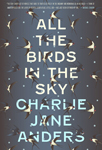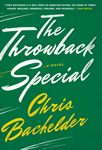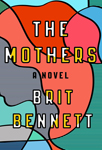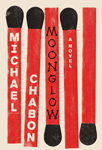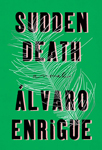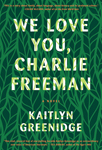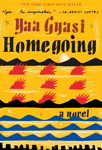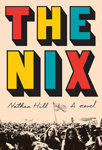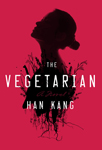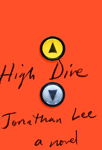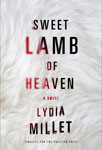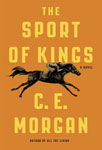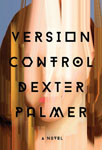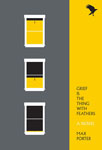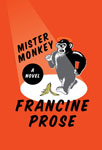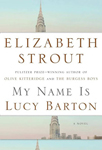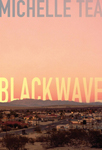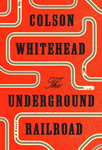by Charlie Jane Anders
Buy it at Powell’s »Bim Adewunmi: On the one hand, this is a serious time, during which we must measure the weight of our words and wield them only after careful consideration. On the other, judging this round is definitely the hardest thing a person has ever had to do in the history of human endeavour. Because listen, Charlie Jane Anders is a wiz with words, a careful constructor of big ideas delivered in pithy, funny sentences. And Colson Whitehead? Well, he is a master of the succinct and precise. And so picking one story over the other felt like sawing my own arm off. I loved both books so much, and in such different ways, that it felt like picking between a banana and a plantain: Both are delicious and nutritious, and both look very similar from a distance, but they are two very different beasts, and they generate very different reactions in my core. It’s been a difficult few months, sorry.
The story of Laurence and Patricia, the two beautiful creatures at the center of All the Birds in the Sky, is, plainly put, a love story. Laurence (whose name immediately brought to mind the character from Little Women) is Science: He is preoccupied with the logical and empirical, an inventor with a fear, or at least a healthy distrust, of nature and the outside. Patricia is Magic, weird and something of a “feeler”: The outdoors is a pleasure land, every bit of flora or fauna a potential point of interest. Despite this, their friendship blooms and grows, just like the edelweiss Captain von Trapp sang about. Of course, even in science versus magic narratives, real life intrudes and the blooming is interrupted, although they reconnect in later life. The result has consequences that reach far beyond the two of them, spreading out to encompass our very planet. It is spectacular and terrible and beautiful.
And O, the sentences in this book!
Here’s a perfect one: “Patricia found herself still obsessing about Laurence as she slid on knee-high leather boots and a black babydoll dress with red sparkles and went to an Irish bar in the Financial District to put a curse on someone.”
And here’s another, from a graduate of the Nameless Assassin School, Theodolphus Rose, if you please: “This was the longest he’d gone without killing someone in years, and his hands kept getting ideas.”
I laughed a lot reading All the Birds in the Sky, because Anders is funny. She has an ear for the absurd and she clearly doesn’t believe in talking down to her reader, which meant a lot of the science stuff, even the bits that were clearly made up, zoomed right over my head. (Anders was a founder of the site io9.) I did most of my reading on a plane, and I laughed out loud a fair few times, which makes people on planes uncomfortable. It’s so darkly funny, though! And desperately human, and so warm. It was unsettling, but deeply charming along with it. If you’re thinking more about the end of the world—and frankly, who isn’t these days?—this is the companion for you. The end of the world might well have us on our devices, helpless, with good intentions burning in our throats.
I found myself thinking about Lyra Silvertongue and Will Parry, the main characters of Philip Pullman’s His Dark Materials trilogy. This was Lyra and Will 2.0, allowed to reach adulthood, and without the oh-so-heavy metaphors of the death of God and the Eve myth hanging over them. Or at least, it was heavy in a different way. Laurence and Patricia’s dilemmas are rooted in a much more recognisable world: of being at a certain age and feeling like you’re coasting; about wanting something to change but feeling like it is intangible and therefore beyond your reach; of imposter syndrome, and men who assault women; of “emotional robots,” computer viruses, and doomsday devices. (Can you see my tenuous Trumpian link? Thank you for noticing.)
On the other hand, Colson Whitehead’s The Underground Railroad is uniquely rooted in the real world, and a known history at that. It’s a stunningly simple idea: to tell the story of the Underground Railroad, only why not make it a literal thing, a series of actual tunnels and stations, with everything that brings with it? In Whitehead’s hands, the story of Cora, a runaway and a passenger on the railroad out of Georgia, thrums steadily, and almost all of it fits under the umbrella of a “Terrible, Horrible, No Good, Very Bad Day.” America’s sin of slavery is not new, but its terrors have been somewhat dulled over time, thanks to the human capacity to forget, as well as the concerted efforts of a determined few to make it seem “not that bad.”
So Whitehead brought some of that back. Here’s a definitively chilling line on a slave catcher: “Ridgeway gathered renown with his facility for ensuring that property remained property.” The matter-of-fact tone is perhaps the book’s strongest weapon. You do not need to embellish horror: It’s in the way Ridgeway calls all the enslaved people “it,” and it lives in one specifically chilling paragraph about the punishment meted out to another runaway that will haunt me forever.
The goodness (or otherwise) of white folks is explored in tiny ways throughout this book: what they can learn to live with, and what they cannot. On the railroad, Cora ends up in North Carolina, a state whose race laws forbid “colored men and women.” It is the home of Martin and Ethel Wells, somewhat reluctant stationmasters on the railroad. Perhaps this betrays another wider urge to center whiteness even in a book about American slavery, but I found them the second most compelling part of the book, after Cora. They are allies to the resistance, and they ultimately pay for it. But they are allies. And that was a compelling point Whitehead makes explicitly: Slavery is as much a part of white history as it is part of black history. Its impact on black people is clear and undeniable, but it did a number on white people too, not least in creating and perpetuating an empathy gap so many still struggle to breach today.
Here is Ethel, enthusiastic freedom fighter, ruminating on slavery: “Slavery as a moral issue never interested Ethel. If God had not meant for Africans to be enslaved, they wouldn’t be in chains.”
I thought about that line as I attended the women’s march in Washington the day after the Trump inauguration, and I thought about the 53 percent of white women who had voted for the new president.
And so ultimately, that’s what it came down to. For the particular hunger I am feeling today, I chose the plantain over the banana. It fed me better. Anders’s prose—pretty, joyous, and inventive—felt a little too light next to Whitehead’s. Perhaps that feeling came from my own headspace, which is currently dark and stormy. But The Underground Railroad called to me more urgently than All the Birds in the Sky. I suspect in any other year, alongside any other book, the latter would win, in a landslide. But here we are. Happy 2017.
Match Commentary
By Kevin Guilfoile & John Warner
John Warner: Before we start, let's do another call-out: Folks, if you haven't taken 30 seconds to support the ToB and TMN as a Sustaining Member, please do so now.
Kevin Guilfoile: If you want to see the Rooster again this time next year, and the year after that—heck, if you want to find out what Andrew and Rosecrans are talking about with this ToB Summer Reading Series thing—your support will make it happen. Thank you, hugely.
John: Also, a quick note to tell all fans of All the Birds in the Sky to stay tuned to the end of the commentary for a chance to engage in an event related to the book that should be pretty cool.
Kevin: Have you ever been to a play about some action-packed event—a war, say, or a horse race—that must necessarily take place offstage? The focus of the drama is on human relationships affected by the Big Thing, but the thing itself happens elsewhere. Anders does quite a bit of that in All the Birds in the Sky. Some pretty crazy stuff happens, but most (not all, but most) of the full-blown Avengers-type action sequences take place off the page.
Obviously Anders is not limited by the three walls of a stage, so this is a deliberate choice on her part, and I think it really works. It’s easy to imagine the ways this story could have spun far beyond this volume. Anders must have put hundreds of hours of idle thought just into the mental construction of her parallel witch schools Eltisley Hall and Eltisley Maze. She could have expanded that premise alone into multiple, door-stopping volumes (and I don’t want to discourage her, I would read those books), but she constructs that entire, fascinating world and then leaves it in fewer than 20 pages here.
Anders has pulled off a neat trick in which she keeps the pace of the novel breakneck, but its focus is entirely on the relationship between Patricia and Laurence. We observe this love story closely on the stage while comic book pages turn rapidly, just out of our sight.
There are disadvantages to this, of course. Instinctively, we want to see that good stuff, and some readers will probably be frustrated (others will find the plot to be way too much, of course). You can imagine this story being told very differently, and over hundreds more pages. It might even have been awesome that way. But Anders makes a legitimate decision not to do that. Her restraint keeps the reader tethered to her leads.
John: Sly. All the Birds in the Sky is sly. It’s funny in a sly way, as Judge Adewumni notes, and even the structure is sly, dodging all kinds of narrative problems by keeping that action off the page. Even the increasingly apocalyptic nature of the world is marked by which hip eating spots remain open in a decaying San Francisco.
Kevin: I’m reminded of David Mitchell’s The Bone Clocks, which was almost my favorite novel of 2014. For 300 or more pages, that novel is beautiful and brilliant. Then in the penultimate chapter, Mitchell goes 100 percent comic book. He does it on purpose, as an experiment with genre. But I just didn’t think it worked at all. Wonderful characters were suddenly flattened along with the action.
(By the way, I like comic books. I’m talking specifically about trying to translate the experience of reading a graphic story/novel into prose.)
I don’t judge most writers by the standard I judge David Mitchell. But Anders makes the opposite decision in this novel, and I think it pays off.
John: She gets us invested in the love story of the two characters in the center of these storms and stays true to it. I think I was even harder on The Bone Clocks than you because Mitchell’s turn felt like a betrayal to me at that point in the novel. It wasn’t really, since the whole novel was an exercise in trying to stitch different genres together. (Maybe the problem is that the text adventure form peaked with Zork.)
But All the Birds in the Sky maintains its internal integrity, I think largely by making use of some of the cultural texts most readers bring to the experience. We don’t need, or even want a detailed exploration of yet another dystopian landscape. Harry Potter is in the world, so Anders only needs to sketch in enough detail about magic school to allow us to fill in the blanks in a kind of compare and contrast mode.
There’s a ton of heart in All the Birds in the Sky, and it was the kind of book where I’m reading more and more quickly toward the end, hoping that Laurence and Patricia are going to be OK. But as a guy who tries in fits and starts to solve the problem of writing a novel, I admire even more the solution Anders brings to those challenges.
Kevin: “Men start off good and the world makes them mean. The world is mean from the start and gets meaner every day.” Those two sentences from The Underground Railroad have been knocking about in my head since I read them. It’s not a new idea, but an idea so cleanly stated and so perfectly contextualized (and so attuned to our moment in time) that the effect becomes profound. Whitehead is in control of this story, of these characters, on every page. He is so damn good. Nobody should want to be compared to him.
Judge Adewunmi pauses to consider the role of virtuous white characters in this book. There is a long history in literature (and film) of inserting white saviors into African-American narratives (presumably to give a white audience a ladder into the story). Often these efforts are offensive and unnecessary. Not so here, I don’t think. That is the fate of the powerless. Unless they stumble upon superpowers, or magic, they sometimes require acts of grace from the empowered, from those who resist the lure of being made mean.
These white characters are only instruments, vehicles for her journey. In the end, Cora literally refuses to allow her fate to be decided by a white man, virtuous or otherwise.
John: For fans of All the Birds in the Sky, please tune into a virtual book club with Charlie Jane Anders hosted by Itinerate Literate Books, the leading mobile independent bookstore in the Charleston, SC, area. Starting at 6:30 p.m. Eastern tonight, if you go to the Itinerant Literate Facebook page you’ll be able to be part of the book club itself.
Kevin: And we might still get a chance for more All the Birds in the Sky talk in this space. Anders’s book received more Zombie votes than My Name Is Lucy Barton. If the Zombie Round started today, our cold-blooded creepers would be All the Birds in the Sky and The Vegetarian.
Tomorrow, The Mothers will take on Version Control, with 2017 reader judge and botanist Tim Rinehart doing the natural selecting. Dustin Kurtz, who as manager of Books & Books Grand Cayman has surely the greatest job in all of bookselling, will be our guest commentator.



